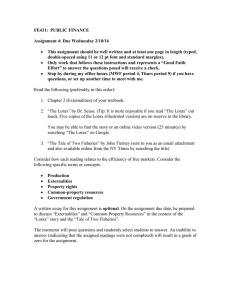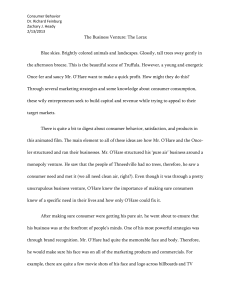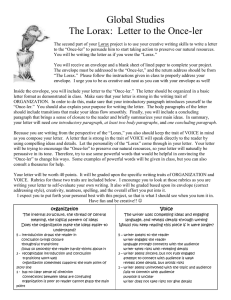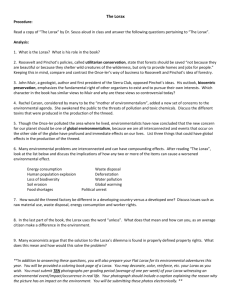6th Grade Language Arts Mrs. Arnett People and power: The Lorax
advertisement
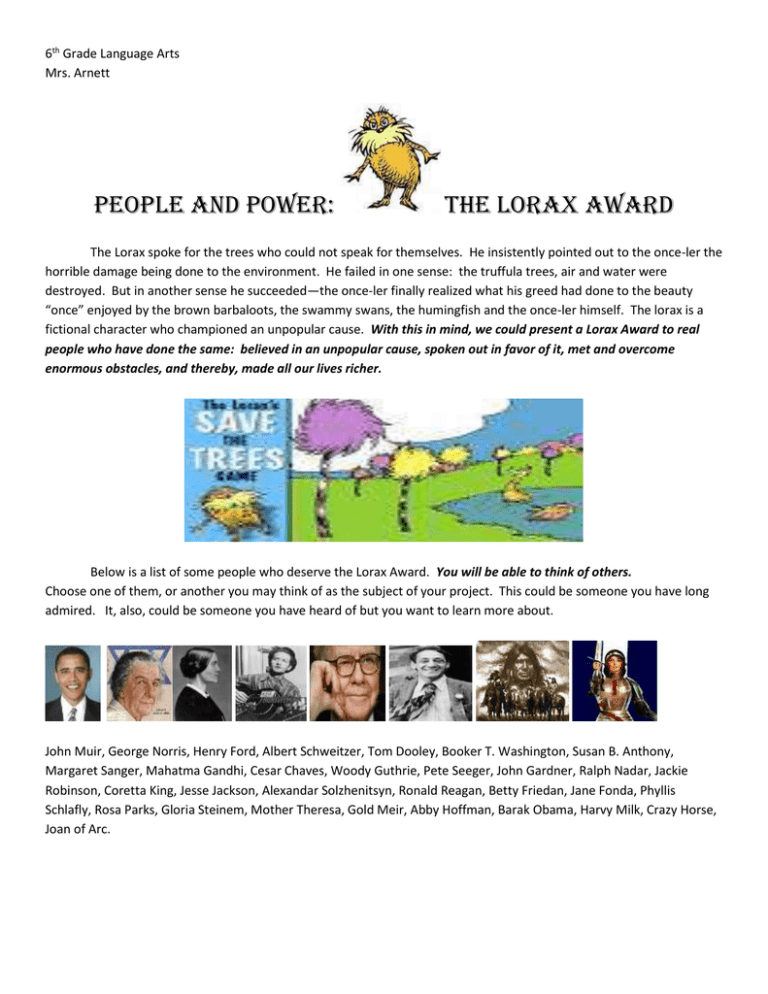
6th Grade Language Arts Mrs. Arnett People and power: The Lorax award The Lorax spoke for the trees who could not speak for themselves. He insistently pointed out to the once-ler the horrible damage being done to the environment. He failed in one sense: the truffula trees, air and water were destroyed. But in another sense he succeeded—the once-ler finally realized what his greed had done to the beauty “once” enjoyed by the brown barbaloots, the swammy swans, the humingfish and the once-ler himself. The lorax is a fictional character who championed an unpopular cause. With this in mind, we could present a Lorax Award to real people who have done the same: believed in an unpopular cause, spoken out in favor of it, met and overcome enormous obstacles, and thereby, made all our lives richer. Below is a list of some people who deserve the Lorax Award. You will be able to think of others. Choose one of them, or another you may think of as the subject of your project. This could be someone you have long admired. It, also, could be someone you have heard of but you want to learn more about. John Muir, George Norris, Henry Ford, Albert Schweitzer, Tom Dooley, Booker T. Washington, Susan B. Anthony, Margaret Sanger, Mahatma Gandhi, Cesar Chaves, Woody Guthrie, Pete Seeger, John Gardner, Ralph Nadar, Jackie Robinson, Coretta King, Jesse Jackson, Alexandar Solzhenitsyn, Ronald Reagan, Betty Friedan, Jane Fonda, Phyllis Schlafly, Rosa Parks, Gloria Steinem, Mother Theresa, Gold Meir, Abby Hoffman, Barak Obama, Harvy Milk, Crazy Horse, Joan of Arc. Your assignment is to compose and deliver a three-five minute speech (commemorative speech) where you pay tribute to a person whom you admire because he/she championed an unpopular cause and in doing so overcame enormous obstacles. Your goal is to arouse and heighten the audience’s appreciation or admiration for the person. Your speech should generate a deep sense of respect. It should be written in such a way to stir audience’s emotions to feel a certain way towards the person receiving your award. Steps: 1. Select a biography or autobiography that is about 100 pages or more. You may purchase this book from a bookstore or you may check it out from a library. No annotations are required with this reading; however, you will be keeping a reader’s response journal. 2. Have the book approved by Ms. Arnett. You can do this by emailing your person’s name, the title of the book, and the author’s name. You need to have the book by January 20 so you can read it. 3. Read the book looking for details about this person you could use to write a speech. 4. Compose readers’ response entries after reading 25-35 pages (You need to do at least 4 entries.) Due dates for these are February 3, February 10, February 17 and February 24. 5. Completer the graphic organizers: one with details from the book and the other the outline for the speech. 6. Compose a commemorate speech that does the following: Uses language in a clear, vivid, and graceful way. Identifies and describes qualities found in this person that your audience can emulate. AVOIDS writing a biography of this person. Uses language devices in the writing of the speech such as: simile, metaphor, alliteration, repetition, parallelism. 7. To edit and proofread the manuscript so that you present an error-free copy to me. 8. To prepare an AWARD that you would, if you could, give to this person. 9. To present the speech to your class using effective nonverbal communication. For the Reader Response Journal choose prompts from the below, and write a page for each response. For the Reader Responses you may use any of the following. You need to write a page for each response. Make connections with your own experience. What does the reading make you think of? Does it remind you of anything or anyone? Make connections with other texts or concepts or events. Do you see any similarities between this text (concepts, events) and other texts (concepts, events)? Does it bring to mind other related issues? Write down striking words, images, phrases, or details. Speculate about them. Why did the author choose them? What do they add to the story? Why did you notice them? Divide your notebook page in half and copy words from the text onto the left side; write your responses on the right. On a first reading you might put checks in the margin where the passages intrigue you; on the second reading, choose the most interesting ideas, then write about them. Did I learn anything from this part of the book? Can I take anything from it to improve myself? This section makes me think about, because... I admire ________ because... Draw a line down the center of your paper. On the left, write facts from what you read. On the right, write your personal opinions about what you read. Describe the most important event. Give at least three reasons why you think it is the most important event. List at least three problems the person faced? Which was the most life changing? How did the person deal with adversity? What events were happening the person’s world (socially, politically, culturally, scientifically …) that shaped the person? Explain. What obstacles did the person face in this section, and how did they deal and think about the obstacles? Who did this person in this section affect? Why? How? What character traits do you admire in this person?
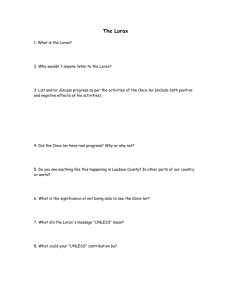
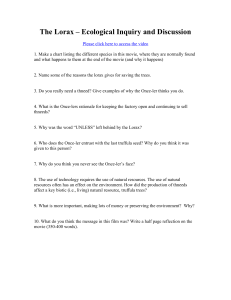

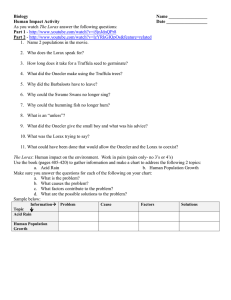
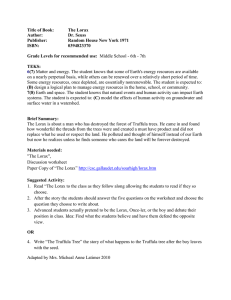
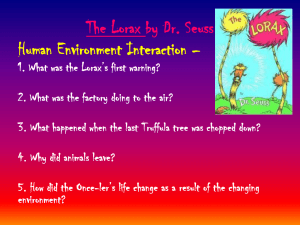
![The_Lorax_questions[1]](http://s3.studylib.net/store/data/008632596_1-e144bd3523e0dd849c2bc4ca9942deff-300x300.png)
